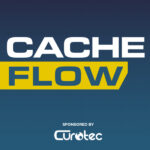Dive deep with a former poker professional turned tech entrepreneur, as he shares a riveting journey of scaling a SaaS company in the competitive world of fantasy sports. From a strategic acquisition to multiplying revenues, gear up for insights on growth levers, product development, and the thrills of business gambles that pay off big.
Here are a few topics we’ll discuss on this episode of Cache Flow Podcast.
- Secrets to 50-80x business growth.
- Crucial SaaS metrics for success.
- Content creation that drives views.
- Power of affiliate channels explored.
- Strategic bets in consumer SaaS.
Resources:
Connect with Andy Baldacci:
Connect with our host, Brian Dainis:
Quotables:
- 08:59 – It’s only been recently that I feel like we’ve really taken much market share from our competitors because when you are telling someone who has made money for years doing things a specific way that the way they’re doing it is not good you, it is just not an argument you’re gonna be likely to win. And so for where we grew was on the back of all of the serious but still recreational players who tried to figure out these tools and just couldn’t get past it. Like even when I try to use ’em now, I don’t even know where to begin sometimes and it takes me so much time. So it’s like if you’re just doing this as a part-time thing, just literally like a couple hours, you have no expectations of going pro or anything else. Like you’re not gonna be able to figure it out and it’s like bad product.
- 15:56 – Brian: So I want to go back to the poker stuff ’cause that’s pretty interesting. I heard the guys on my first million talk about how the degenerate poker players always make the best entrepreneurs.
Andy: I think I view it as you’re going, so one of the biggest things to me is just like prioritization by understanding like probabilistic thinking in the sense of people just always say like, oh this is risky, or oh, this is gonna be like, we’re gonna get some benefit out of this. But they don’t try to quantify the scale of either the risk or the benefit. Like how big of an impact, neither direction is it, and then how often does that happen? And it’s like without those components you miss everything. And it’s, it’s like when people, casual fans, even serious fans when they talk about like betting on sports, it’s like, oh I guess in this Super Bowl it was super close, so it’s like not the best example but like any of the times where there’s been just a really lopsided matchup, they’re like, oh yeah, like earlier I guess in the season it’s like the ravens or the chiefs are gonna crush this team. - 18:17 – Like when people talk about someone being results oriented outside of poker, that’s seen as a good thing in poker, that’s like a horrible thing. It’s you use that as like, oh you’re being way too results oriented right now because you cannot control the outcome of this specific hand. You can control your process and just because you lost the hand does not mean you made a bad decision. But in day-to-day life, that is like the opposite lesson that’s taught. And so I think that mindset is probably the biggest driver of, of success. But I also think a lot of people with anything, it’s like you have the experts in one thing, there’s some clever name for it, but it’s like experts in one thing assume they’re gonna be an expert in the other thing and and it’s like rarely do skills transfer one to one or even close to that.
- 42:28 – What actually happens is that we have a very healthy top of funnel that is generating a lot of new customers and they are churning at a very high rate. I mean not like, well I guess some people would say it would be insane, but like say you have a 50% renewal rate after that first month. Okay then what is it after the second month? What about after the third? And there is some point where like they’re staying and I think there is a lot we can do on those earlier stages, but because we have healthy top of funnel, it’s not an existential problem at all. It is a growth opportunity for us to figure out how do we get these people who might not be, who might be like earlier in their journey up to a place where they can benefit from our tools.
- 39:59 – I think that’s where it’s like people get too stuck on just the number without asking like what is it actually measuring? And so part of it is what is, if someone just plays football and just subscribes to us during football and cancels at the end of the season, is that churn? I don’t think so. I think it’s only churn if they don’t come back next season, then they have left us. But like if all they’re doing is playing football and they play football with us for the season and then cancel, like that’s not true. That is their like contract duration effectively. And like if they leave before that we messed up. But if they leave at the end of the season, like no, like that’s not necessarily the case. So seasonality plays a big role in that and it makes it hard to measure what your like true churn is.





